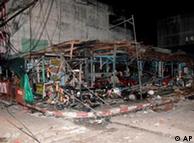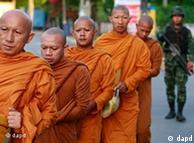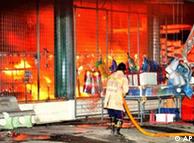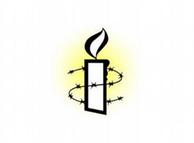The report, released Tuesday, comes as the current insurgency is now in its eight year with almost 5,000 people dead and thousands injured since attacks escalated in early 2004, with most deaths linked to insurgent attacks. It concludes that since 2004 more than 60 per cent of those killed in the conflict have been civilians who played no active part in the hostilities.
Donna Guest, Amnesty's Deputy Asia Program Director, says the report's aim was to point to the attacks against civilians by insurgents in the southern Thai provinces, attacks that have taken place despite extensive counter insurgency efforts by Thai security forces.
 Vehicle bombs killed at least three people and wounded several dozen mid September
Vehicle bombs killed at least three people and wounded several dozen mid September Increased attacks
According to Guest, evidence shows there has been an escalation in the number of attacks on civilians since 2006 "concentrating on so-called soft targets; farmers, and health workers, teachers and students, religious leaders and monks, merchants and civil servants."
Guest added that a majority of the dead were Muslims seen either to be "cooperating too much" with the government or not enough with the insurgents. At the same time, Buddhists, a minority in the southern provincial population, also counted amongst the victims.
The killings, an average of two a day over the past seven years, have included beheadings, people killed by roadside bombs or in drive-by shootings. According to Amnesty the killings constitute war crimes because the insurgents have never clearly articulated their grievances, aims or demands and because these targeted attacks seem to be aimed primarily at spreading terror among the civilian population.
War crimes
The report examined the circumstances surrounding 82 deaths that had resulted from insurgent attacks. Of those, 55 killed were Muslims and 27 were Buddhists.
 Buddhist monks morn attack victims in southern Thailand in June, 2011
Buddhist monks morn attack victims in southern Thailand in June, 2011 The Thai military, which has emergency powers in the south, has also been accused of extrajudicial killings by rights groups. Army operations often trigger revenge attacks by insurgents. Torture and other human rights violations by Thai security forces involved in counter-insurgency also continue, the report adds. It criticizes the fact that there has been a lack of accountability for human rights violations on the part of state authorities.
"It is ultimately the Thai Government's responsibility to ensure the well-being of all Thai citizens," Guest said. The Amnesty report claims the insurgents number around 9,400 including leaders, operatives and supporters. Between January 2004 and June 2011 the report says there was a total of 10,890 incidents of violence leading to at least 4,766 deaths and 7,808 injuries.
Attacks increasingly deadly
In recent incidents bomb blasts in the southern border town of Sungai Kolok in the province of Narathiwat earlier this month left six people dead, including Malaysian tourists, and dozens wounded.
Benjamin Zawacki, a representative of Amnesty International, says "the longer the insurgency goes on just by virtue of the fact that it continues, one could say it's simply getting worse because policies are tried, policies fail."
Zawacki says the recent attacks have become more deadly. Bombs have become more powerful and now regularly contain up to 10 to 15 kilograms of explosives. Thai intelligence reports suggest the insurgents are using plastic explosives smuggled into Thailand.
 Insurgents in Thailand have killed nearly 5,000 people since 2004
Insurgents in Thailand have killed nearly 5,000 people since 2004Chidchanoke Rahimulla, a lecturer at the Prince of Songkla University in Pattani, says police believed the attacks were linked to a crackdown against drug gangs operating closely with insurgents. Trafficking in narcotics is a key source of financing insurgent activities.
Chidchanoke believes the authorities need to separate security policies to deal with drug trafficking on the one hand and the insurgency on the other. "If you want to clean up the drug traders you must have the intention to do it and on a continuous (basis)," she said in an interview.
Author: Ron Corben
Editor: Grahame Lucas
Editor: Grahame Lucas
http://www.dw-world.de/dw/article/0,,6627356,00.html





